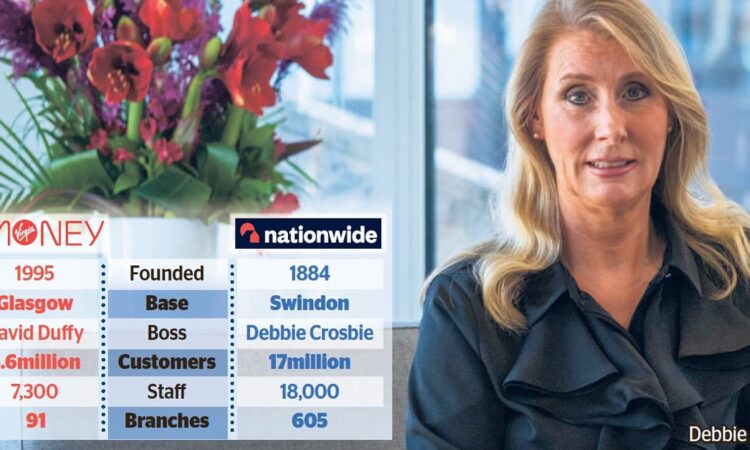
Nationwide and Virgin Money have agreed to join forces to create the second biggest savings and loans group in the UK.
The building society will pay 220p a share, or £2.9billion, for Virgin Money, which was set up by Richard Branson in 1995 and pays the tycoon to use the Virgin name.
The proposed deal will create a business with £366billion of assets and almost 700 branches as Nationwide steps up its battle with the big High Street banks.
Nationwide will continue to use the Virgin Money brand until at least 2030 but eventually the name will vanish from the High Street.
The plan will see yet another FTSE 250 firm leave the London stock market following a wave of mergers and acquisitions.
After being founded by Branson, Virgin Money expanded with the purchase of Northern Rock from the Government after the 2008 financial crisis. Virgin Money was later bought by Clydesdale and Yorkshire Bank for £1.7billion in 2018.
In the ‘medium-term’, Virgin Money will be a separate legal entity within the Nationwide group, with a separate board and banking licence.
There will be no changes to Virgin Money’s 7,300 employees ‘in the near-term’, the announcement said.
Nationwide’s offer of 220p per Virgin Money share was a 38 per cent premium to the bank’s closing price on Wednesday.
Virgin Money shares rose 35 per cent, or 55.65p, to 214.7p yesterday.
Related Articles
HOW THIS IS MONEY CAN HELP
The building society’s mutual members do not need to approve the deal for it to go ahead. But it does need the green light from Virgin Money shareholders. The board has said it is ‘minded to recommend’ the offer to investors.
Nationwide chief executive Debbie Crosbie said: ‘Nationwide will remain a building society and a combined group would bring the benefits of fairer banking and mutual ownership to more people in the UK, including our continuing commitment to retain existing branches.’
AJ Bell investment director Russ Mould said: ‘Nationwide is effectively pouncing on Virgin Money at a time when prospects are improving for its industry.
‘This is slightly unusual as companies often buy rivals at precisely the wrong time – namely acquiring at the top of the market when everything looks good and then overpaying for deals, rather than taking bold steps and acquiring when everything looks bad and valuations are weak.’
He added: ‘We might get interest from other parties now that Nationwide has thrown its hat into the ring, or shareholders might push for a better price.’
Susannah Streeter, head of money and markets at Hargreaves Lansdown, said: ‘A mutual taking over a listed bank is a rare move, but Nationwide clearly does not want to be stuck in the past and wants the knowhow and access to scoop up future customers.’
Barclays said last month it would buy Tesco’s banking operations and it is thought Nationwide’s swoop on Virgin Money could spark further merger and acquisition activity.
‘With the outlook for the UK economy stabilising, we wouldn’t be surprised to see more deals like this,’ said RBC Capital Markets analyst Benjamin Toms.
Some links in this article may be affiliate links. If you click on them we may earn a small commission. That helps us fund This Is Money, and keep it free to use. We do not write articles to promote products. We do not allow any commercial relationship to affect our editorial independence.





